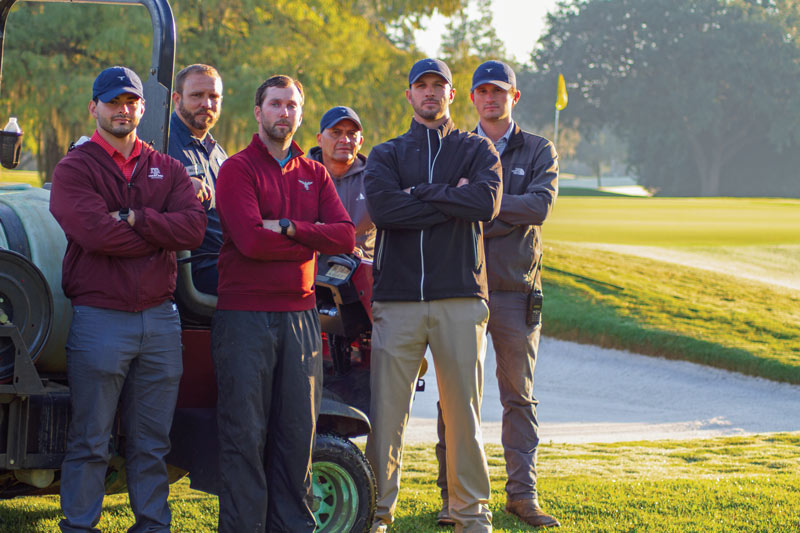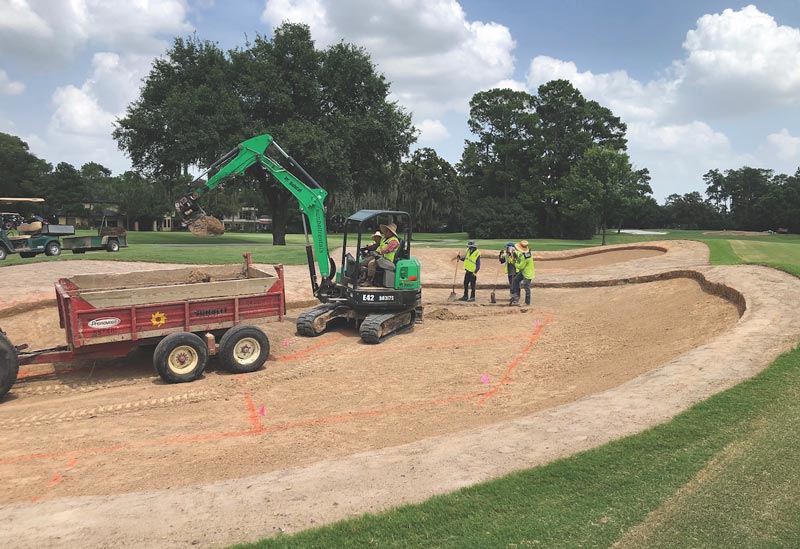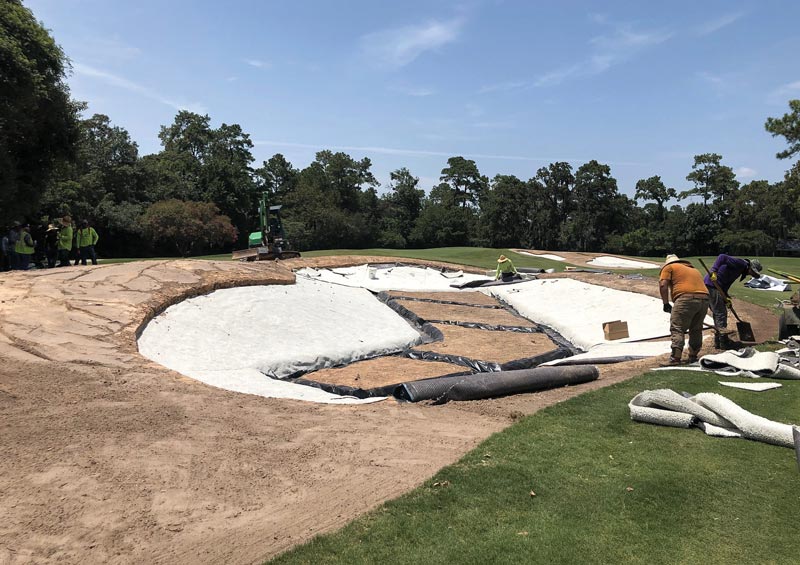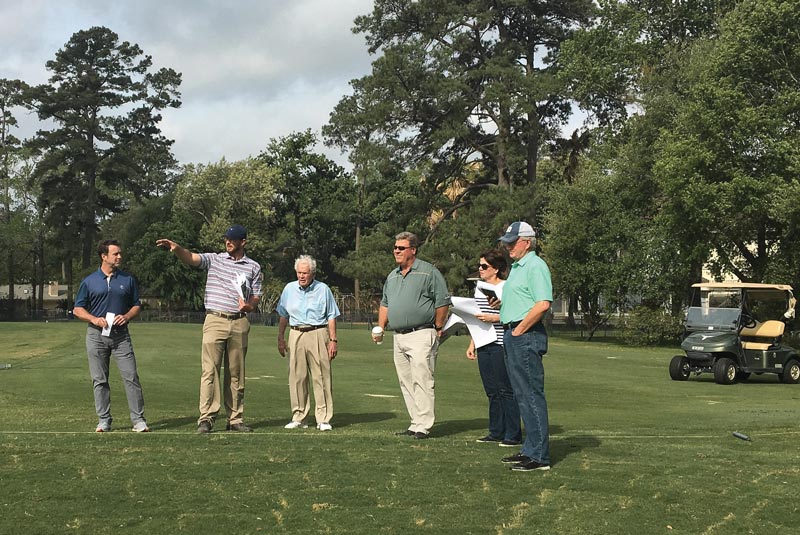
In its move from June to December, the 2020 U.S. Women’s Open has also gone from a one-course affair to a test that will transpire on both courses at Houston’s Champions Golf Club. The maintenance leadership team at Champions GC includes (from left) Charles Crandal, assistant superintendent; Wesley Coots, equipment manager; Brady Forshey, superintendent; Pedro Trejo, foreman; Chris Ortmeier, director of agronomy; and Josh Truelove, assistant superintendent. Photo by Karl Heim
While his baseball teammates slept in on game days, Chris Ortmeier did not.
He awakened before sunrise at his dormitory, Jones Hall, on the campus of Navarro College in Corsicana, Texas. Ortmeier would hop into his pickup truck, which doubled as a tractor during overseed, and drive to the baseball field. Upon arrival, and with the blessing of the coaching staff (and his teammates), Ortmeier would mow the field by himself on an old Toro triplex. “The field was average at best, but it didn’t stop me from striping it up. I even burned an ‘N’ in center field, too,” he says. “I enjoyed doing all that probably as much as I did playing.”
Oh, he certainly could play, which is why the Chicago Cubs picked the right-handed hurler in the 31st round of the Major League Baseball draft when he was a teenager. Yet after moving on from Navarro to play for Texas Tech University, Ortmeier decided to take a swing at turfgrass management.
Though he was superb at striking out batters, Ortmeier didn’t whiff on his career choice — and it has taken him to a place in the superintendent world that sets him apart from his colleagues in one aspect in particular.
For the first time, in 2020, a professional women’s golf major will be held in December. Ortmeier is director of agronomy at Champions Golf Club in Houston, site of the 75th U.S. Women’s Open, scheduled Dec. 10-13. It was postponed from June 4-7 because of the COVID-19 pandemic. Four years ago, when Champions GC was awarded the U.S. Women’s Open, nobody told Ortmeier, or anyone else for that matter, that 2020 would be, to use a phrase familiar to Ortmeier, laced with curveballs.
“The biggest thing for us is the variability in weather we can have here,” says Ortmeier, a 14-year GCSAA member who will oversee the first major championship in December since the 1984 Senior PGA Championship at PGA National Golf Club in Palm Beach Gardens, Fla. “Looking at the last five years of weather data, we’ve been as low as 30 degrees and as high as 84. The most rainfall for one day was 4.61 inches, the winds have blown as hard as 30 mph, and we even had an inch of snow on Dec. 8, 2017. It was a 180-degree change when the date was moved from June to December. One thing where superintendents excel at is being able to adapt and change. We’ll have to be ready for anything.”
An eyeful of Champions
Viewers will get to see all of Champions GC’s 36 holes during the U.S. Women’s Open, though it wasn’t originally supposed to be that way.
Champions Golf Club, which is about 20 miles north of downtown Houston and was founded by major golf champions Jack Burke Jr. and Jimmy Demaret in the late 1950s, is best known for its Cypress Creek Course. Designed by Ralph Plummer, the Cypress Creek Course has hosted, among other events, the 1967 Ryder Cup, 1969 U.S. Open and 1993 U.S. Amateur. It’s also where legend Ben Hogan played his last competitive round, in 1971.

The par-3 12th hole on the Cypress Creek Course at Champions Golf Club, which will play host to the long-delayed 2020 U.S. Women’s Open next month. Photo courtesy of the USGA
The Cypress Creek Course was set to host the U.S. Women’s Open by itself until COVID-19 created havoc, and the change to two courses has much to do with the amount of daylight that will be available so late in the year. The first two rounds will be played at Cypress Creek as well as the adjacent Jackrabbit Course, designed by George Fazio and renovated by Tom Fazio. Ortmeier was notified March 31 that both courses would be needed.
“It doubled the workload leading up to the championship, as well as during it,” says Ortmeier. “It takes twice the volunteers and equipment. While the grass will not be growing as much in December as it is in June, we still have twice the greens, tees, fairways, bunkers and approaches, mulch beds, pine straw ... but our team has gladly accepted the challenge.”
Editor’s note: With the PGA Tour’s Charles Schwab Challenge last June, Texas’ Colonial Country Club and those who maintain it found themselves at the forefront of a trial run of the return of pro golf. Read all about it in Pro golf and greenkeeping in the time of coronavirus.
Not much time has passed since each course at Champions GC was renovated. Most recently, and most urgently, was the renovation of the bunkers on Jackrabbit. That work concluded in early September to be ready for the U.S. Women’s Open. Two years ago, bunker renovation was part of a project at Cypress Creek, where greens were also rebuilt to USGA specs. On both courses, greens are TifEagle, and fairways are 419 bermudagrass. On Cypress, Latitude 36 has been installed around surrounds and bunker faces.
Shannon Rouillard, the USGA’s senior director of championships for the U.S. Women’s Open, champions what Ortmeier and his staff have accomplished, especially given the small window of time the crew had to tackle the bunker project on Jackrabbit. “Chris has been a fantastic partner in all of this. He’s a professional. He knows his courses very well. When I got back there for a site visit in October, you would be hard-pressed to tell they were done just a month or two ago,” Rouillard says.
The U.S. Women’s Open is one of four USGA championships that will have gone off as planned in 2020. The association canceled 10 championships this year because of the pandemic.
Champions Golf Club’s return to prominence
This one is for the Burkes.
Superintendent Brady Forshey helps oversee both courses at Champions GC, where significant events were once a given. Besides the Ryder Cup and U.S. Open, each more than 50 years ago, the club also hosted multiple Tour Championships, including the one where Tiger Woods prevailed in 1999. Yet after hosting the Tour Championship in 2003, Champions GC has hosted only one other notable event, that being the 2017 U.S. Women’s Mid-Amateur.
Restoring the glory days at Champions GC has been a goal for all involved and is a sincere nod to Burke and his wife, Robin, runner-up in the 1997 U.S. Women’s Amateur.


The Jackrabbit Course at Champions Golf Club underwent bunker renovations leading up to next month’s U.S. Women’s Open. Because of the daylight difference between June and December, Jackrabbit was incorporated into the mix for the 2020 U.S. Women’s Open and will be used for the first two rounds. The Cypress Creek Course will be used for all four rounds. Photo courtesy of Heritage Links
“What we have done with the courses here shows how dedicated we are to having this Women’s U.S. Open, which the Burkes have been wanting to do for years,” says Forshey, a five-year GCSAA member. “It is important to them to have large events. This is so good to put Champions back in the national spotlight.”
Burke, 97, winner of both the 1956 Masters and PGA Championship, remains a guiding light to Ortmeier, who refers to him as “Mr. B.”
“Everyone respects him. He truly has committed himself to perpetuating the game, especially at the amateur level,” Ortmeier says. “He’s been a great mentor, and no one is a bigger supporter of superintendents than Jack Burke Jr.”
No doubt there are some pretty talented amateurs at Champions GC. Ortmeier notes that 53 members carry plus handicaps. He hears from them, too. “The members have been appreciative for all of the improvements we’ve made. As a player’s club, they have very high expectations. With high expectations comes an even greater appreciation for quality conditions,” Ortmeier says.
Holiday golf
In a normal year, December often means vacation time for Ortmeier’s team members during the holiday season. Not this year. They’ve got too much work on their plate.
“I told them we have to change the schedule, so 2020 vacations will have to extend into 2021,” Ortmeier says. “I feel lucky to have a wife (Jenna) who has been with me since my first job at 16 and who understands the flexibility this job requires. Along with my kids (Greysen, Jackson and Lawson), they are a great support system.”

Champions Golf Club was host to the 1967 Ryder Cup and 1969 U.S. Open. Doing some observation in preparation for the facility’s next turn in the national spotlight this December are (from left) Jon O’Donnell, president, Heritage Links; Chris Ortmeier, director of agronomy; club president Jack Burke Jr.; former major champion Hal Sutton, club board member; Robin Burke, club vice president; and Chet Williams, architect, Cypress Creek Course restoration. Photo courtesy of Heritage Links
Forshey, though, won’t be sticking around until next year. He will join his fiancée, Ashlea Krupa, in Pittsburgh, where she is in dental school and where he has accepted a position as an assistant superintendent at St. Clair Country Club. When he departs, probably the day following the U.S. Women’s Open, Forshey will pack an experience that Ortmeier has supplemented. “He’s a great role model. He continues to push me,” Forshey says. “He’s allowed me to grow.”
That sounds familiar. Ortmeier says Scott Ebers, CGCS, superintendent at Colonial Country Club in Fort Worth, Texas, served as the same type of mentor. Ebers, though, still kids about how he would like to have become Ortmeier’s mentor much sooner. He had a good feeling that Ortmeier would be something special. “When we hired him, we were six to eight weeks from hosting our PGA Tour event, and he was still finishing up baseball at Texas Tech. We wanted him on the property really bad,” says Ebers, a 28-year GCSAA member (Ortmeier made it to Colonial early during tournament week). “After he was with us for a while and left (in 2014 for Champions GC), you knew he was more than ready, and there was no doubt he would have enormous success. He was kind of really good at everything.”
For Ortmeier, hosting a major championship is about as good as it gets. And quite a privilege.
“I’m very grateful to have worked at two of the most iconic clubs, as far as tradition goes, in Texas,” Ortmeier says. “It’s an honor to preserve their history and tradition on the golf course while being able to raise their standards and make improvements where we could.”
Howard Richman is GCM’s associate editor.